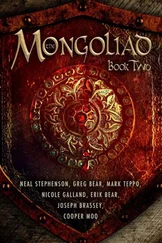Neal Stephenson - The Mongoliad - Book One
Здесь есть возможность читать онлайн «Neal Stephenson - The Mongoliad - Book One» весь текст электронной книги совершенно бесплатно (целиком полную версию без сокращений). В некоторых случаях можно слушать аудио, скачать через торрент в формате fb2 и присутствует краткое содержание. Город: Las Vegas, Год выпуска: 2012, ISBN: 2012, Издательство: 47North, Жанр: Эпическая фантастика, Фэнтези, на английском языке. Описание произведения, (предисловие) а так же отзывы посетителей доступны на портале библиотеки ЛибКат.
- Название:The Mongoliad: Book One
- Автор:
- Издательство:47North
- Жанр:
- Год:2012
- Город:Las Vegas
- ISBN:978-1-61218-236-0
- Рейтинг книги:5 / 5. Голосов: 1
-
Избранное:Добавить в избранное
- Отзывы:
-
Ваша оценка:
- 100
- 1
- 2
- 3
- 4
- 5
The Mongoliad: Book One: краткое содержание, описание и аннотация
Предлагаем к чтению аннотацию, описание, краткое содержание или предисловие (зависит от того, что написал сам автор книги «The Mongoliad: Book One»). Если вы не нашли необходимую информацию о книге — напишите в комментариях, мы постараемся отыскать её.
The Mongoliad: Book One — читать онлайн бесплатно полную книгу (весь текст) целиком
Ниже представлен текст книги, разбитый по страницам. Система сохранения места последней прочитанной страницы, позволяет с удобством читать онлайн бесплатно книгу «The Mongoliad: Book One», без необходимости каждый раз заново искать на чём Вы остановились. Поставьте закладку, и сможете в любой момент перейти на страницу, на которой закончили чтение.
Интервал:
Закладка:
How could she slip out of the city unseen? Every encounter was a potential disaster. She had to figure out a way to vanish without being seen by anyone .
Or be in the company of someone who could protect her. Someone who, like her, was running away.
Gansukh.
Could she convince him to flee with her?
CHAPTER 32:
THE SECRET OF THE CAVES

The rough timbers of the monastery wall were aged and warped, and there were numerous gaps and holes in the wood. Covered in pitch, they were a poor defensive barrier, if they had ever been intended as such. Cnán and Finn approached the wood cautiously and dared to peek through the gaps.
Whereupon they discovered the source of the stench.
As they had climbed the rough path, the smell had gotten worse, as if they were climbing through veritable layers of stink. What little breeze there had been had fled, and now, in the torpid stillness of the afternoon, the smell clung to them. It seeped through the seams in her clothing and beneath her hair. Earlier, with the assistance of Yasper’s mint tincture, she had kept her stomach in order, but now… Steeling herself against a dangerous loss of her self-control, she leaned toward the stained and warped wall again and put her eye up to a spy hole.
Animal carcasses—so many she couldn’t bear to count them—littered the ground as though tossed there by the hands of some immense, thoughtless child. Most had been stripped of their hides and left to rot in the summer heat. Some of the bodies appeared to squirm and twitch, and she refused to let herself imagine that some of those bloody and flayed bodies might be alive… No, those were maggots and ants at work inside their ribcages.
“Hide workers,” Finn muttered, shaking his shaggy head. “Lazy and wasteful.” Waddling sideways, he gestured for her to follow him.
She crept along in his wake, breathing through her mouth.
Inside the wall, the one-storied buildings were arranged around a rectangular common. They were simple structures, and there was little art in their construction. One each for sleeping, eating, and praying , she thought, counting them. And one more for their grisly work… In the open courtyard, there was another structure, a narrow stone well house with a worn wooden door.
Of the Livonians and the ragmen, there was no sign.
“Where…?” Cnán hissed at Finn, who only shrugged in return. She moved a few feet farther along the wall, choosing a different gap to spy through. She squinted, shifting her body from side to side in an effort to see more of the courtyard. But it made no difference. The monastery was deserted.
“Where did they go?” she wondered aloud. It was possible they were inside one of the buildings, but she couldn’t fathom an explanation as to why. The gate had been opened readily enough, which meant they had been invited inside and were not—as Feronantus had mistakenly said—chasing the ragged hide workers. But what was so important in these buildings that they ran away from us? she wondered.
Finn tapped her on the shoulder and pointed at the top of the wall. He mimed climbing and held out his hands for her to use as a brace. “Oh no,” she shook her head, “I’m not touching that wall.”
“Would you prefer the front gate?” he asked.
“I would prefer not—”
A clank of metal against stone interrupted her, and they both returned their attention to the monastery.
Two Livonians had suddenly appeared and were standing next to the well house. One had put his shield down, leaning it against the wall. It was the sound of the metal rim scraping against the stone that had alerted them. The Livonians were sullen and angry—not with each other, she realized, but rather with an order they had been given.
“The two who fainted,” Finn whispered. “Guard duty.”
“Guarding what?”
As if in response to her question, the well house door creaked open to disgorge one of the raggedy monks. The Livonians kept their distance, and the monk jabbered animatedly at them in Ruthenian, stopping only when one of the knights put his hand on his sword hilt. Cackling like a diseased crow—and looking not unlike one as well—the rag-covered man scampered away, ducking into the nearest building.
Cnán eyed the well house. The hut was tiny, and while it might hold all three of the men and the well, she couldn’t imagine the Livonians tolerating the presence of the foul monk for longer than a heartbeat.
With the monk gone, the Livonians had no one to torment, and their attentiveness gave way to lethargy and boredom. The shieldless one began to cast about, his attention on the nearby ground. Looking for a place to sit down , Cnán thought, and she couldn’t blame his reticence.
“Caves,” Finn said.
“What?”
“Caves,” he repeated. “Under this hill.” He grabbed her shoulder, pulling her away from the wall. “We must tell Feronantus.”

“I was surprised when Illarion showed no interest in coming down here,” Roger muttered to Raphael. “Now I wish I had thought a little harder about what it signified.”
He was a voice from the darkness. During the first part of the expedition—a descent into cellars, subcellars, and crypts of the priory—Vera had lit their way with a torch. The depredations of the Mongols had left fine oils in short supply, and so this consisted of a rag on a stick, soaked in rendered animal fat that was available for purposes of illumination only because it had gone rancid. This had stunk even before she had ignited it and had produced a spreading plume of thick, greasy smoke that they could have followed with their noses even had they not been able to see its fitful yellow light.
After a series of descents into ever deeper, moister, and darker parts of the substructure, they had reached a place where the ceiling had become so low and the ventilation so poor that Vera had been obliged to douse the torch—though not before using it to ignite a pair of crude candles, consisting of the pith of some plant soaked in tallow. By the light of these they crawled through a low opening and thus entered into something that was clearly a natural cave. Chisel marks on the wall proved that it had been widened, and mortared ashlars provided level footing, at least for the first few dozen paces.
Roger’s comment was probably a reference to the way the place smelled. It was not well ventilated. Certain notes in the aroma made it obvious that these caves must communicate somewhere with all the gutters of Kiev. That, in and of itself, was hardly unusual. One could not go anywhere near a human habitation without smelling what ran in its gutters. The musty spoor of an uncontrolled rodent population was mixed with it. Too, though, Raphael’s nose was detecting an unmistakable smell of dead flesh. Not the unbearable, nausea-inducing ripeness of something that had died recently, but rather the product of a slow decay that had been going on for a long time.
“It is remarkable,” Raphael said, “that cities can be so very different in their buildings, their peoples, and their customs—but the catacombs are always the same.”
Vera and Percival were several paces ahead of them; the Shield-Maiden knew the way and moved nimbly through the passages, which were becoming rougher and more twisted the deeper they penetrated into the heart of the hill. Percival was carrying their candle and casting a long shadow on the floor in his wake, which Raphael tried to fill in with the feeble light of his own candle. But he was dazzled by the flame directly before his face. The floor was becoming more uneven—the masons had not ventured into this part of the catacombs to lay down pavers. Roger edged in front so that the candle flame would not be shining into his eyes, and Raphael held the candle high to shine the light over Roger’s shoulder, to let him find the way and warn him of any hazards.
Читать дальшеИнтервал:
Закладка:
Похожие книги на «The Mongoliad: Book One»
Представляем Вашему вниманию похожие книги на «The Mongoliad: Book One» списком для выбора. Мы отобрали схожую по названию и смыслу литературу в надежде предоставить читателям больше вариантов отыскать новые, интересные, ещё непрочитанные произведения.
Обсуждение, отзывы о книге «The Mongoliad: Book One» и просто собственные мнения читателей. Оставьте ваши комментарии, напишите, что Вы думаете о произведении, его смысле или главных героях. Укажите что конкретно понравилось, а что нет, и почему Вы так считаете.







